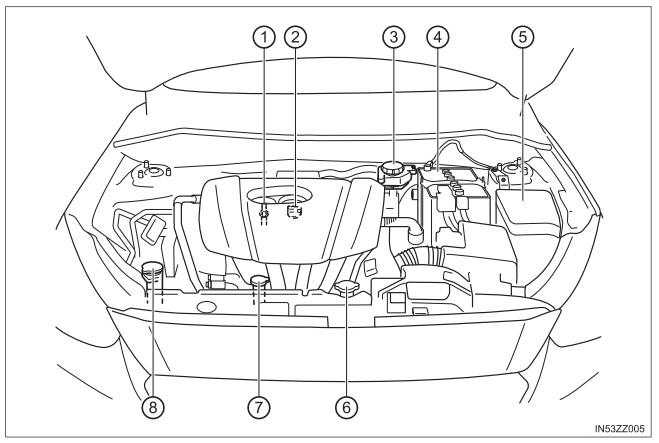Toyota Yaris: Owner Maintenance / Engine Compartment Overview
Toyota Yaris XP210 (2020-2026) Owner's Manual / Maintenance and Care / Owner Maintenance / Engine Compartment Overview

- Engine oil dipstick
- Engine oil-filler cap
- Brake/Clutch fluid reservoir
- Battery
- Fuse block
- Cooling system cap
- Engine coolant reservoir
- Windshield washer fluid reservoir
 Hood
Hood
With the vehicle parked, pull the
release handle to unlock the
hood.
Insert your hand into the hood
opening, slide the latch lever to
the right, and lift up the hood...
 Engine Oil
Engine Oil
Changing the engine oil should be performed by your Toyota dealer.
Refer to Introduction for owner’s responsibility in protecting
your investment...
Other information:
Toyota Yaris XP210 (2020-2026) Owner's Manual: Contact Your Toyota Dealer and Have Vehicle Inspected
If any of the following warning lights turns on/flashes, the system may have a malfunction. Contact your Toyota dealer to have your vehicle inspected. ABS Warning Light When the engine is jump-started to charge the battery, uneven rpm occurs and the ABS warning light may illuminate...
Toyota Yaris XP210 (2020-2026) Reapir and Service Manual: Installation
INSTALLATION PROCEDURE 1. INSTALL REAR SEAT INNER BELT ASSEMBLY LH (a) Install the rear seat inner belt assembly LH with the bolt. Torque: 42 N·m {428 kgf·cm, 31 ft·lbf} Protruding Part NOTICE: Do not allow the anchor part of the rear seat inner belt assembly LH to overlap the protruding parts of the vehicle body...
Categories
- Manuals Home
- Toyota Yaris Owners Manual
- Toyota Yaris Service Manual
- Diagnostic Trouble Code Chart
- Auto Lock/Unlock Function
- Removal
- New on site
- Most important about car
Supplemental Restraint System (SRS) Precautions
The front and side supplemental restraint systems (SRS) include different types of air bags. Please verify the different types of air bags which are equipped on your vehicle by locating the “SRS AIRBAG” location indicators. These indicators are visible in the area where the air bags are installed.
The air bags are installed in the following locations:
The steering wheel hub (driver air bag) The front passenger dashboard (front passenger air bag) The outboard sides of the front seatbacks (side air bags) The front and rear window pillars, and the roof edge along both sides (curtain air bags)
Copyright © 2026 www.toyaris4.com
